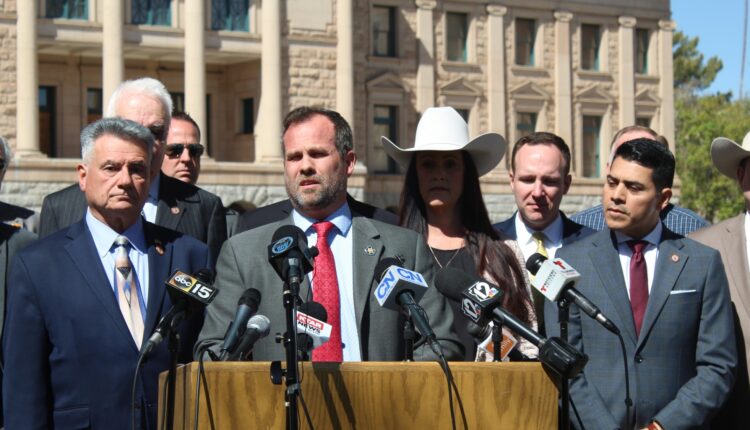Katie Hobbs vetoed a GOP immigration bill. She might get to veto it two more times.
Republican lawmakers, stung by Gov. Katie Hobbs’ veto of a bill that aimed to give the state the federal government’s job of arresting and deporting migrants, have decided one veto wasn’t enough, so they say they will send her the same bill again.
And, just for good measure, when that one is inevitably vetoed, they’ll pass the same bill a third time and invite Hobbs to veto that one, as well.
Doing so, they said Monday, will cast her as unwilling to address Arizona’s border issues.
And after that, GOP leaders said, they may just send the matter to voters in November.
GET THE MORNING HEADLINES DELIVERED TO YOUR INBOX
SUBSCRIBE
Last week, Hobbs shot down a bill that would have made it a class 1 misdemeanor to cross the state’s southern border anywhere but at a port of entry. The proposal was at the top of the legislative agenda for the GOP, which has focused on harsh immigration policies this session to appeal to voters ahead of the 2024 election.
Hobbs vetoed the bill because she said it would be harmful to immigrant communities, hurt Arizona businesses, burden law enforcement and was unconstitutional — meaning it would result in costly and lengthy litigation.
Senate President Warren Petersen denounced the veto on Monday, slamming Hobbs for criticizing the federal government’s approach to immigration but failing to back the GOP proposal. The Democrat has been vocal about her disapproval of the Biden administration’s immigration policies, but has repeatedly said she will only support humane solutions and has advocated for increasing the funding of law enforcement agencies and border communities.
Petersen announced that the two identical mirrors of the vetoed proposal would be sent up to the Ninth Floor, along with a host of other border-focused bills.
“Governor Hobbs: talk is cheap,” the Republican from Gilbert said. “Sign our bills.”
And once the mirrors bills meet Hobbs’ veto stamp, Petersen said the party is ready to circumvent the governor by sending the question directly to voters.
“If we need to go around her with a constitutional amendment or statutory amendment, we will,” he said. “If she won’t secure our border, that’s something we can do.”
A legislatively referred ballot measure doesn’t require the governor’s approval. But Petersen noted that Republicans would prefer to gain Hobbs’ signature, saying it’s better to enshrine lengthy, complicated proposals as laws via the traditional legislative process. That’s because voter-passed initiatives are protected by the 1998 Voter Protection Act, which prohibits lawmakers from making changes unless they go back to the voters for permission, leaving them with little recourse if unforeseen problems arise.
The effort to make crossing Arizona’s border a crime is modeled after a Texas law that is currently on appeal to the U.S. Supreme Court, with the U.S. Department of Justice challenging it over its blatant unconstitutionality. The law is temporarily on hold until later this week while the high court reviews the case.
The courts have consistently ruled that enforcing immigration law is under the sole jurisdiction of the federal government. The last time Arizona attempted to usurp that enforcement, the state dealt with costly legal challenges. In 2012, the U.S. Supreme Court struck down three of four provisions in SB1070, the state’s infamous “show me your papers law” that allowed police officers to detain and investigate the citizenship status of people during routine traffic stops, and ruled that the federal government has supreme authority over immigration law.
But Republican lawmakers on Monday said that the fear of lawsuits outlined by the governor in her veto letter is overblown.
Sen. John Kavanagh, R-Fountain Hills, pointed out that the U.S. Supreme Court’s bench is more conservative than before, and posited that it might be more likely to agree with Arizona and Texas laws aimed at protecting their citizens.
“We have a new Supreme Court, and I believe that stepping up and having state involvement will, in fact, be ruled constitutional,” he said. “We owe our constituents, we owe our country at least to try to do that.”
The proposal’s goal, according to supporters, is securing the Arizona’s southern border to stem the flow of crime and fentanyl — an often repeated refrain from Republican politicians, despite studies that have found migrants are less likely than citizens to commit crimes and data which shows that the vast majority of fentanyl is smuggled by U.S. citizens through the official ports of entry.
“We need to stop the drugs,” said Sen. Janae Shamp, R-Surprise, who sponsored the vetoed bill. “The only way to do that is for us to be able to give law enforcement the tools that they need.”
“The majority in this legislature is acting in order to protect the people,” added Gina Swoboda, the chairwoman of the Arizona Republican Party. Swoboda is also a contractor for the state Senate, which pays her $15,000 a month to advise on election policy.
Among the border-focused bills and initiatives on their way to the governor’s desk and the November ballot are measures to punish those who sell fentanyl with first degree murder if the sale results in a person’s death; steeply fine employers who hire undocumented workers; designate drug cartels as terrorist organizations; make it a class 2 felony to use a phone or computer application, such as social media apps, to engage in human smuggling; and make it easier for Arizona ranchers to shoot migrants on their property.



Comments are closed.